“I told my grandmother, I would love to dance as well. That’s all. That’s how it all started, at the Zama Dance School in Gugulethu.” It’s late in the afternoon when we speak, and Mamela Nyamza is at her home in Pretoria; she has recently returned from a few weeks in Paris, where she choreographed and danced in the opera Le Vol du Boli, directed by British musician Damon Albarn (from the band Blur and Gorillaz) and Mauritanian film director Abderrahmane Sissako (behind the movies Timbuktu and Bamako).
One would expect her to be exhausted – after months of lockdown, she jumped on a plane to France to join a team of about 60 musicians and dancers, not only to dance but also to choreograph an opera in French, a language she does not speak, only a few weeks before it opened. Yet, she looks everything but exhausted – her energy is radiating, coming through the screen in bursts like commanding entrechats and powerful grands jetés.
In fact, talking about dance – and the body, which she uses as a formidable tool to interpret, understand and have an impact on life, hers and others – seems to trigger an invincible élan, a superpower of sorts. “Dance has given me so many opportunities as somebody who grew up in Gugulethu. In my childhood, I missed my mom…”, she says.
Here, the pace of the conversation seems to speed up a little. Nyamza’s words come out quickly, as if she is eager to share this dip into her past, but not to pour out her heart, and not to let the pain linger any longer.
“My mum was absent in my life. She was such a liberal woman. A lot happened in her life. She decided to go and live, like a bohemian, in a way, you know. So, she was absent in my life and the dance kind of filled that gap for me; sometimes they say, ‘art is life’, it made me so connected to it; I would come back from school and go back to dancing. So it did not make me feel like I did not have my mom next to me.
“And then while I was still growing up, my mom got killed by a man. My mom. She was 44. She was the same age as I am today.”
Nyamza says that she made the decision to use her work, and by extension her own body, to talk about women’s issues.
“I was driven by my mother’s loss. And how she died; she was killed by a lover… by a boyfriend, which is still happening today in South Africa. I know many people would look at me and say, like, ‘Why is she so forward into activism, why is she always taking these stories so seriously?’, not knowing that my mother, in the late ’90s, died because of the same issues that we’re still dealing with today in South Africa.”
Since graduating from the Tshwane University of Technology with a National Diploma in Ballet in 1994, Mamela Nyamza’s work has been dipped in activism, focusing on women’s issues as well as reflecting on and confronting what it means to be a black woman, a mother, a ballerina, an artist in South Africa and around the world. An influential choreographer who intertwines different dance genres to mirror society’s failings, Nyamza’s work is moving, surprising and thoughtful.
An influential choreographer who intertwines different dance genres to mirror society’s failings, Nyamza’s work is moving, surprising and thoughtful – in Hatched which she created in 2008, she confronts our patriarchal society; in The Meal, an epitome of dance-theatre leaning towards performance, she dances in a pink tutu, exposing in carefully crafted moments the discriminated-against black body in “traditional” dancing spaces; in I Stand Corrected, she tackles homophobia, while Phuma-Langa speaks about “division and reconciliation”; these are but a few of the choreographer, dancer and teacher’s prolific work over the years.
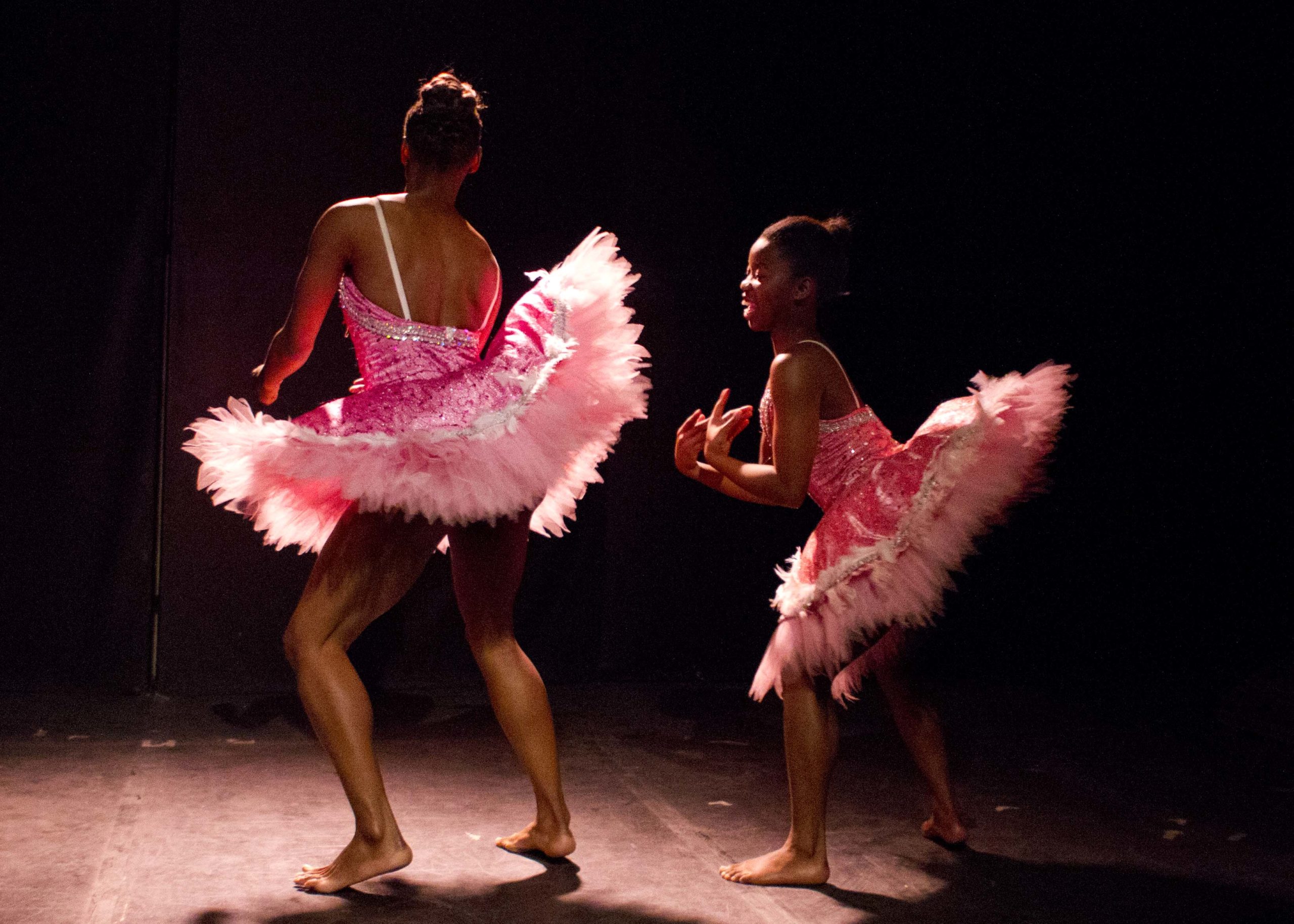 THE MEAL (Image supplied; © stef)
THE MEAL (Image supplied; © stef)
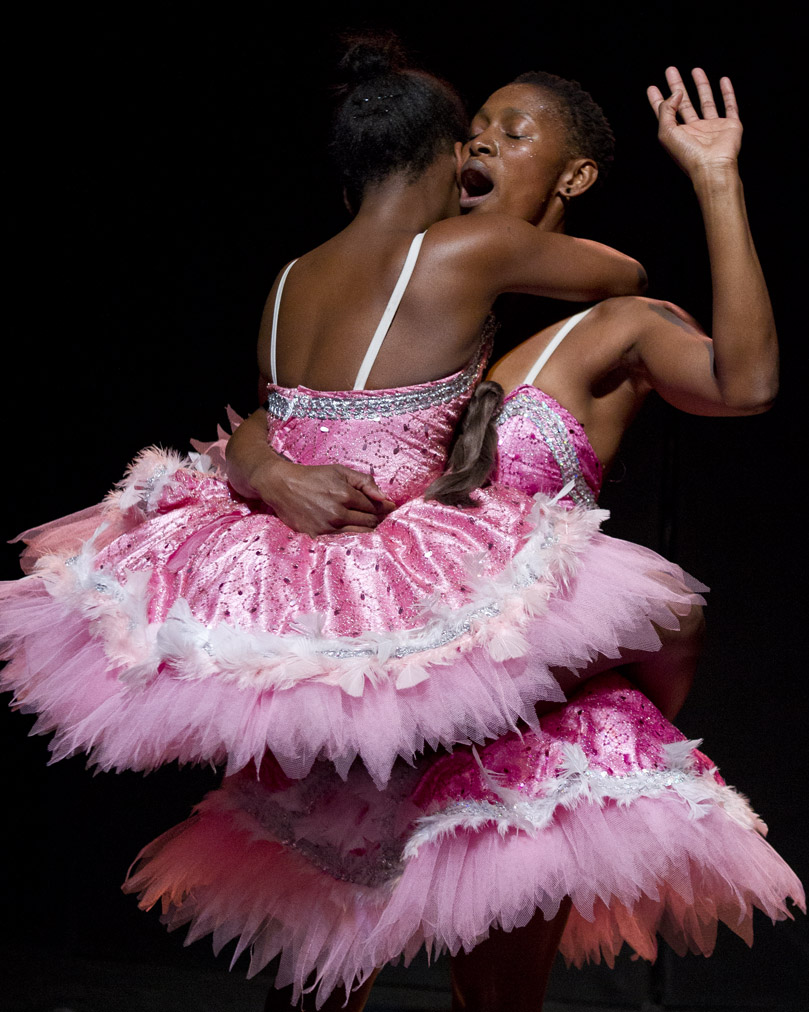 THE MEAL (Image supplied; © stef)
THE MEAL (Image supplied; © stef)
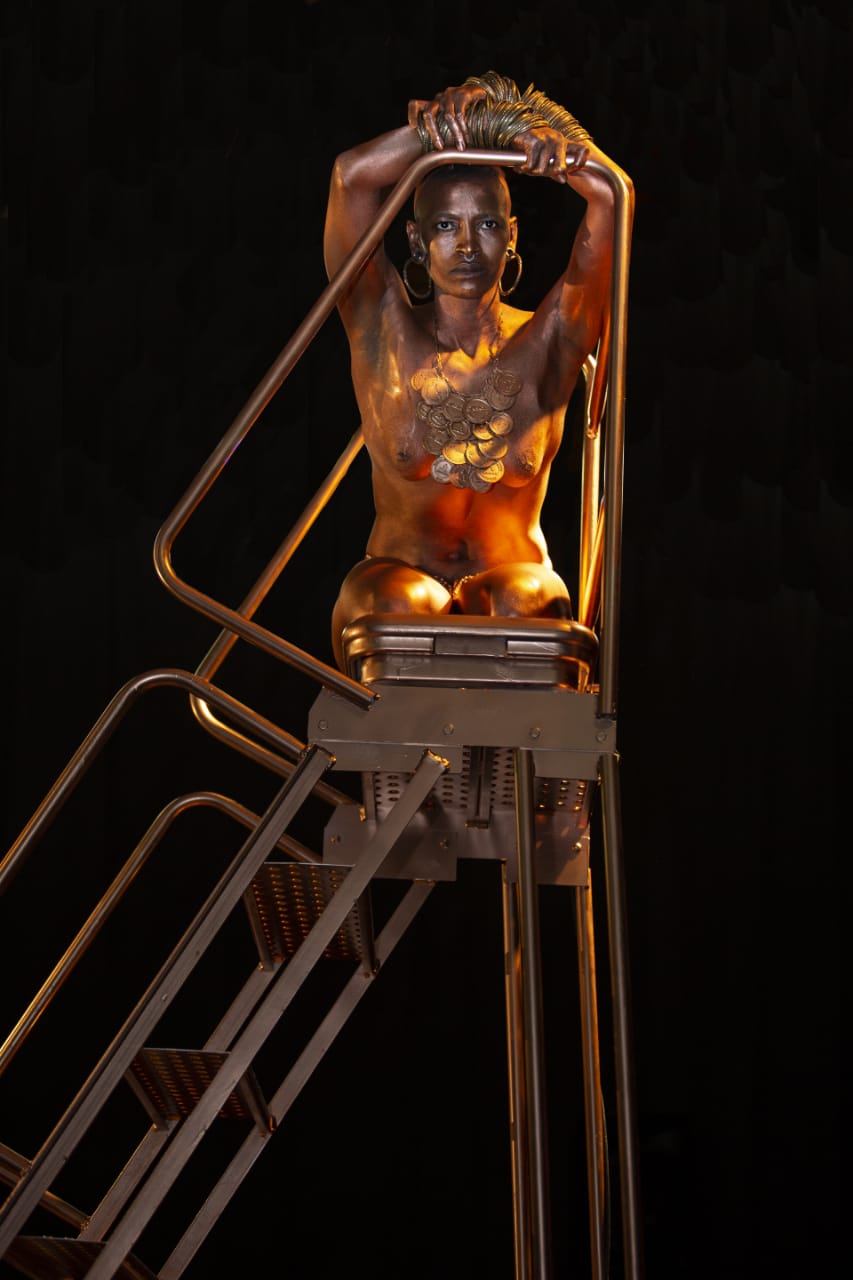 New Dance 2009. Prog. 9, Wits Theatre, Johannesburg. 'Hatched' choreographed, directed and performed by Mamela Nyamza. (Photograph : John Hogg)
New Dance 2009. Prog. 9, Wits Theatre, Johannesburg. 'Hatched' choreographed, directed and performed by Mamela Nyamza. (Photograph : John Hogg)
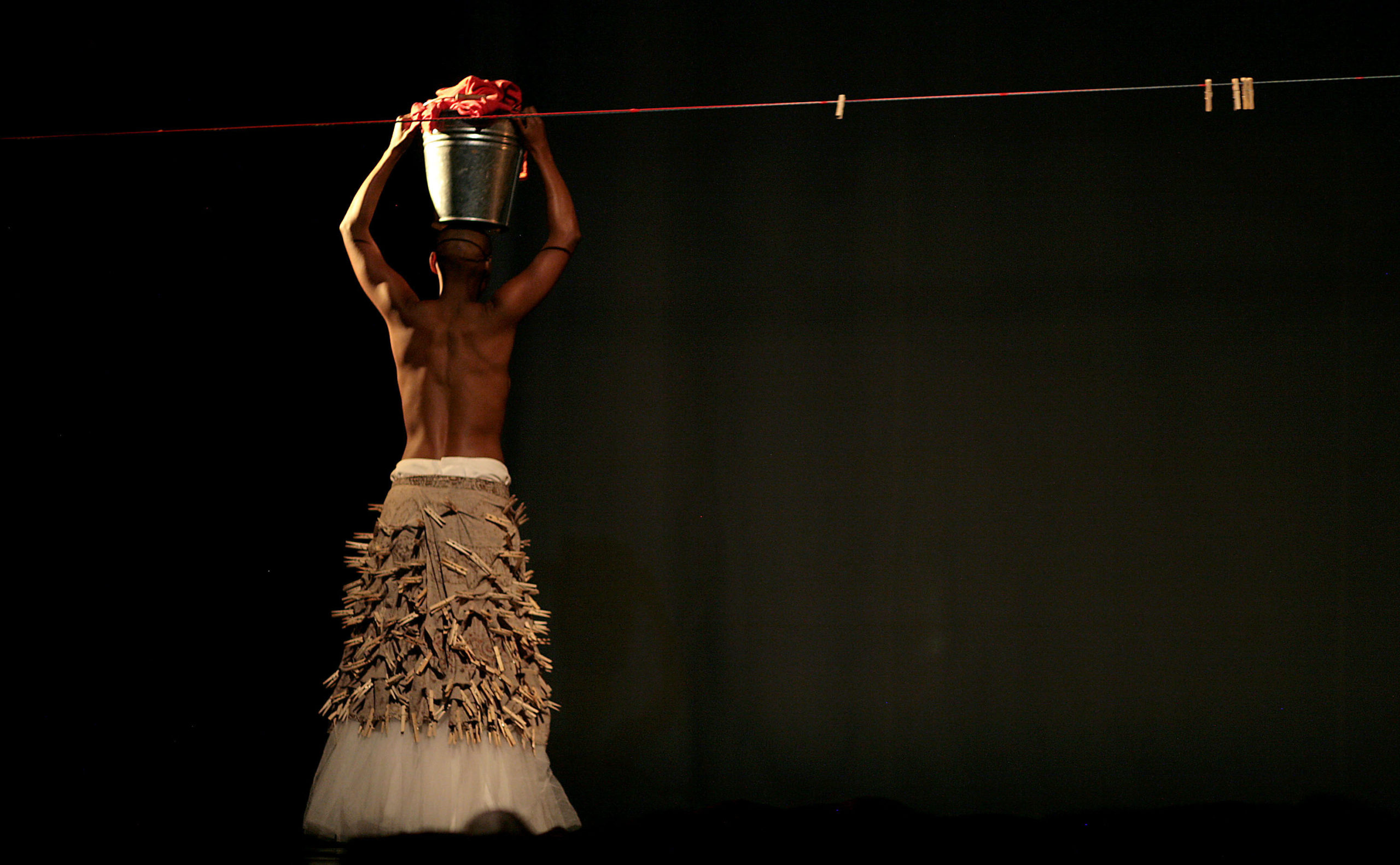 New Dance 2009. Prog. 9, Wits Theatre, Johannesburg. 'Hatched' choreographed, directed and performed by Mamela Nyamza. (Photograph : John Hogg)
New Dance 2009. Prog. 9, Wits Theatre, Johannesburg. 'Hatched' choreographed, directed and performed by Mamela Nyamza. (Photograph : John Hogg)
“My questions are still not answered. Why are women being killed?... My work always deals with these issues of women, the involvement of women, the freedom of women, because I felt like [my mother] was not free. I felt like she could not fly and be a bird. And I felt like I’m living her life. And as somebody who’s so spiritually awoke, I feel like she’s speaking through me… to speak about the issues that are happening, that have happened in her life… I’m going to tell stories that matter to me and the women in this country.”
And so, Nyamza speaks, dances and flies.
She was awarded a scholarship at the Alvin Ailey International School for Dance in New York, danced in musicals including The Lion King in 2004, and We Will Rock You two years later, and her career up until today looks like the CV of someone whose international acclaim is magnetic and phenomenal – from being a choreographer for the US television show So You Think You Can Dance?, to competing in the NBC’s show Superstars of Dance, and, in 2011, winning the Standard Bank Young Artist Award.
Still, in spite of a career that has taken her around the world, and a role of “ambassador” for South Africa’s culture and arts in a way, there is a pinch of sadness and incomprehension at how her own country is treating her.
“I’m still flying the flag of Gugulethu, flying the flag of the Tshwane University of Technology, flying the flag of the Zama Dance School where I come from. But the challenge is that at home, they do not recognise such talent. You know… I only say my country loves to celebrate mediocrity,” she notes.
“South Africa does not take care of its artists. But I’m so used to it now. The challenges we face, I mean, even during the lockdown. I struggled to get a relief fund from the government, but this is the same woman who is flying around the world representing South Africa.”
When she speaks one can hear the obvious tension between her deep love, dedication and admiration for her home, the longing for it, and the incredulity and anger at how little care and admiration she feels she is receiving in exchange – even worse, the extent to which this is happening to many artists around her, as if the spotlight on South African arts and culture was glimmering brighter on other shores.
Still, Nyamza keeps going and she keeps dancing.
“I just became that person who’s like, ‘I’m gonna do it. I’m gonna try and see’. And I’m that person who does not give up. I’m a fighter by nature. I don’t give up easily. If somebody taps on my toes, I fight; that’s what the industry has made me be. And that’s what all the challenges I’ve faced as a woman in this country have made me be, because as a dancer I have to deal with so many issues of trying to fit in as a black woman. And that’s through a white people way. So that was also a challenge for me as a black woman having a specific body type, I had to fit in, and I made it.”
Indeed, all her life, Nyamza had to “fit in” in an industry whose standards are particularly exclusionary. Other dancers, like Misty Copeland or Paige Fraser, have been vocal about racism and how the black body is judged in ballet, for Nyamza the one way to fight it, to move things forward, was to use all her experiences and instil her work with them.
“I’ve used all my childhood experiences, all my life experiences as a woman growing older, from adolescence to teenager to womanhood, to married woman, to divorced woman, to coming out and being a lesbian woman; all my life has just been connected to my work, everything that I’m part of has been embedded in my own experiences of a woman growing up in South Africa.”
Now, she has been able once more to use her experiences and her incredible talents to create the choreography of Le Vol du Boli, which showed at the Théâtre du Châtelet in Paris last October.
The opera stems from the story of a theft: a boli, a “power object” that comes from Mali, which plays “an essential role within Bamana spiritual life”. The man behind the theft is Michel Leiris, who during the Dakar-Djibouti mission (1931-1933), stole the boli from the village of Dyabougou, in the region of Ségou. The boli is still today exhibited as part of the African collection at the Quai Branly-Jacques Chirac Museum.
 Rehearsal VOL DU BOLI au théâtre du châtelet le 26 septembre 2020 (Image Hélène Pambrun)
Rehearsal VOL DU BOLI au théâtre du châtelet le 26 septembre 2020 (Image Hélène Pambrun)
 British musician Damon Albarn; Spectacle "Le Vol du Boli" au Théâtre du Châtelet à Paris, le 6 octobre 2020. Image © Cyril Moreau/Bestimage
British musician Damon Albarn; Spectacle "Le Vol du Boli" au Théâtre du Châtelet à Paris, le 6 octobre 2020. Image © Cyril Moreau/Bestimage
 Rehearsal VOL DU BOLI au théâtre du châtelet le 26 septembre 2020 (Image Hélène Pambrun)
Rehearsal VOL DU BOLI au théâtre du châtelet le 26 septembre 2020 (Image Hélène Pambrun)
 Spectacle "Le Vol du Boli" au Théâtre du Châtelet à Paris, le 6 octobre 2020. © Cyril Moreau/Bestimage
Spectacle "Le Vol du Boli" au Théâtre du Châtelet à Paris, le 6 octobre 2020. © Cyril Moreau/Bestimage
Nyamza had only six weeks to work with the opera’s dancers and musicians. “We became a family. Some of the musicians are from London, and others from Paris, Burkina Faso, Congo, Mali, Senegal; we were like a bunch of people from all over the world”.
Brigitte Macron, France’s first lady, who attended the opera, was so impressed by the show that she asked to meet the artists once the curtain fell. Nyamza remembers that, “when I was told the first lady was asking about the choreography, I ran back on stage to take pictures with her, it was an amazing moment”.
The opera has received great praise even though it ran for only three days.
“It speaks to the awareness about what has happened to us in the past and what has been lost in Africa. And what needs to be told because we need to tell such stories and if we, our generation, are not going to be talking about our history then our history will be lost… That’s why this story was so important to me. Also for the young generation coming up to know that their stories can be told in such big theatres, with big scenarios, so that they can respect their stories.
“Sometimes we reflect on what we’re seeing and if we don’t see ourselves on stage we’ll never understand our history being told the way other histories are being told,” she says.
“It’s always the best thing to tell your stories your way. As Steve Biko would say, ‘I write what I like’; well, I dance what I like...” DM/ML




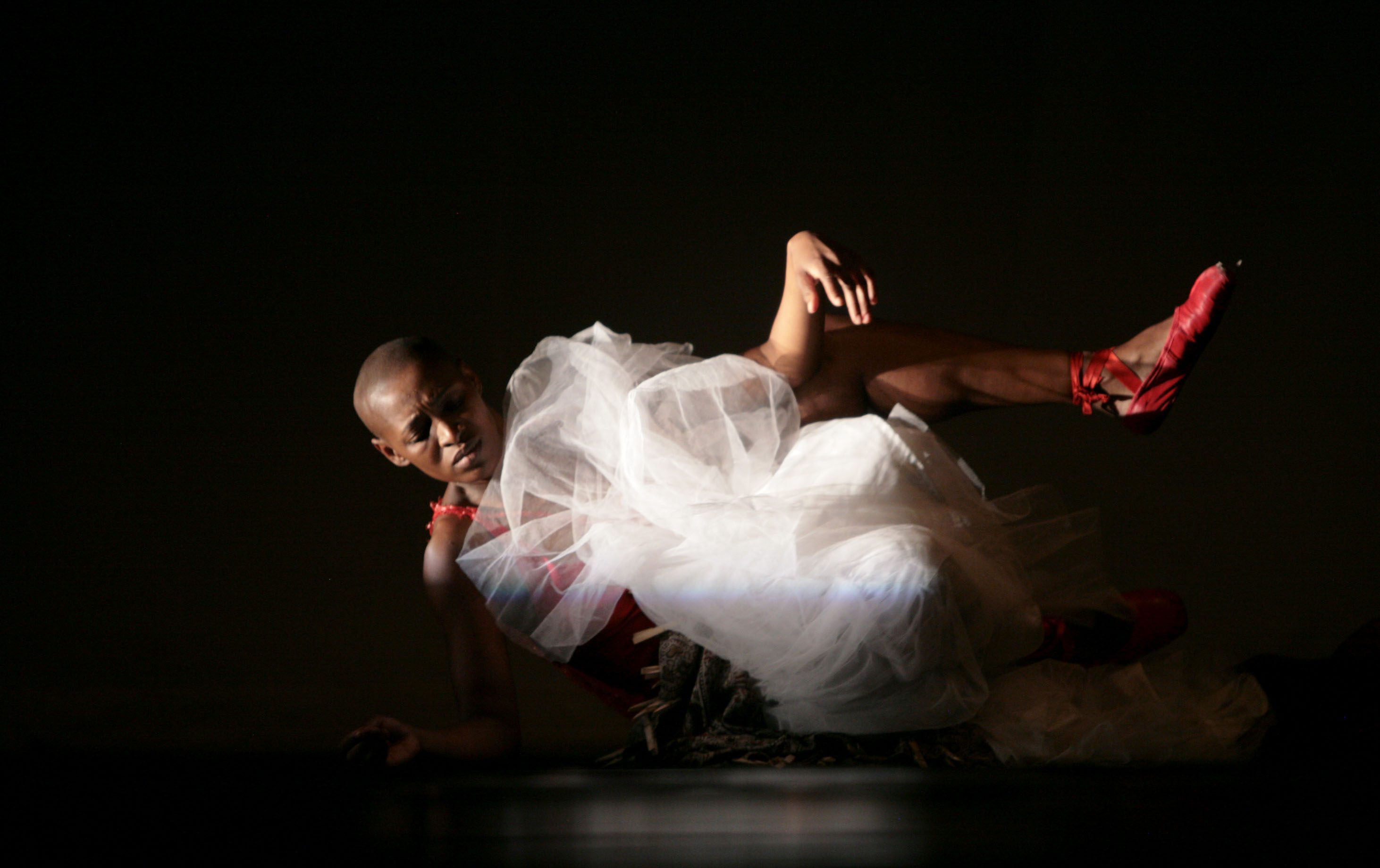 Exclusif - Spectacle "Le Vol du Boli" au Théâtre du Châtelet à Paris, le 6 octobre 2020.
Le Théâtre du Châtelet a rouvert ses portes au public avec "Le Vol du Boli", du 2 au 18 octobre 2020. &8232;"Le Vol du Boli" est une création du Théâtre du Châtelet imaginée par Damon Albarn et Abderrahmane Sissako, cinéaste notamment primé aux César pour son film "Timbuktu", qui signe ici sa première mise en scène : une épopée musicale, un voyage dans l'histoire de l'Afrique et de son rapport à l'Europe, du XIIe siècle à nos jours. Si, après « Monkey, Journey to the West » et « Wonder.land », il s'agit de la 3ème création de Damon Albarn pour le Châtelet, ce sera la toute première fois que le cofondateur des groupes Blur et Gorillaz sera présent pour chaque représentation sur la scène du Châtelet, parmi les musiciens. © Cyril Moreau/Bestimage Exclusive
No web/No blog pour Belgique/Suisse
Exclusif - Spectacle "Le Vol du Boli" au Théâtre du Châtelet à Paris, le 6 octobre 2020.
Le Théâtre du Châtelet a rouvert ses portes au public avec "Le Vol du Boli", du 2 au 18 octobre 2020. &8232;"Le Vol du Boli" est une création du Théâtre du Châtelet imaginée par Damon Albarn et Abderrahmane Sissako, cinéaste notamment primé aux César pour son film "Timbuktu", qui signe ici sa première mise en scène : une épopée musicale, un voyage dans l'histoire de l'Afrique et de son rapport à l'Europe, du XIIe siècle à nos jours. Si, après « Monkey, Journey to the West » et « Wonder.land », il s'agit de la 3ème création de Damon Albarn pour le Châtelet, ce sera la toute première fois que le cofondateur des groupes Blur et Gorillaz sera présent pour chaque représentation sur la scène du Châtelet, parmi les musiciens. © Cyril Moreau/Bestimage Exclusive
No web/No blog pour Belgique/Suisse 